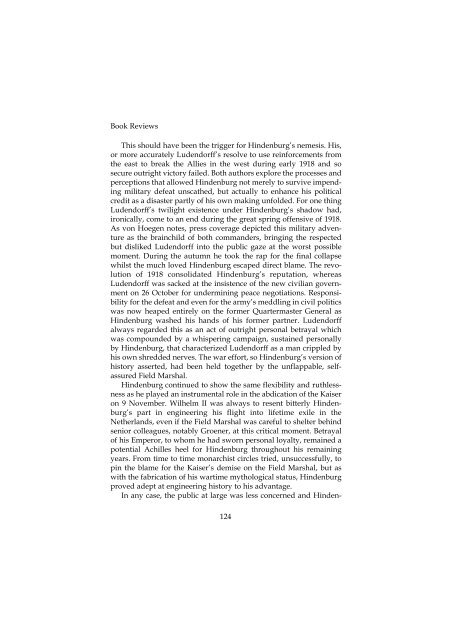Download - German Historical Institute London
Download - German Historical Institute London
Download - German Historical Institute London
Create successful ePaper yourself
Turn your PDF publications into a flip-book with our unique Google optimized e-Paper software.
Book Reviews<br />
This should have been the trigger for Hindenburg’s nemesis. His,<br />
or more accurately Ludendorff’s resolve to use reinforcements from<br />
the east to break the Allies in the west during early 1918 and so<br />
secure outright victory failed. Both authors explore the processes and<br />
perceptions that allowed Hindenburg not merely to survive impending<br />
military defeat unscathed, but actually to enhance his political<br />
credit as a disaster partly of his own making unfolded. For one thing<br />
Ludendorff’s twilight existence under Hindenburg’s shadow had,<br />
ironically, come to an end during the great spring offensive of 1918.<br />
As von Hoegen notes, press coverage depicted this military adventure<br />
as the brainchild of both commanders, bringing the respected<br />
but disliked Ludendorff into the public gaze at the worst possible<br />
moment. During the autumn he took the rap for the final collapse<br />
whilst the much loved Hindenburg escaped direct blame. The revolution<br />
of 1918 consolidated Hindenburg’s reputation, whereas<br />
Ludendorff was sacked at the insistence of the new civilian government<br />
on 26 October for undermining peace negotiations. Responsi -<br />
bility for the defeat and even for the army’s meddling in civil politics<br />
was now heaped entirely on the former Quartermaster General as<br />
Hindenburg washed his hands of his former partner. Ludendorff<br />
always regarded this as an act of outright personal betrayal which<br />
was compounded by a whispering campaign, sustained personally<br />
by Hindenburg, that characterized Ludendorff as a man crippled by<br />
his own shredded nerves. The war effort, so Hindenburg’s version of<br />
history asserted, had been held together by the unflappable, selfassured<br />
Field Marshal.<br />
Hindenburg continued to show the same flexibility and ruthlessness<br />
as he played an instrumental role in the abdication of the Kaiser<br />
on 9 November. Wilhelm II was always to resent bitterly Hinden -<br />
burg’s part in engineering his flight into lifetime exile in the<br />
Netherlands, even if the Field Marshal was careful to shelter behind<br />
senior colleagues, notably Groener, at this critical moment. Betrayal<br />
of his Emperor, to whom he had sworn personal loyalty, remained a<br />
potential Achilles heel for Hindenburg throughout his remaining<br />
years. From time to time monarchist circles tried, unsuccessfully, to<br />
pin the blame for the Kaiser’s demise on the Field Marshal, but as<br />
with the fabrication of his wartime mythological status, Hindenburg<br />
proved adept at engineering history to his advantage.<br />
In any case, the public at large was less concerned and Hinden -<br />
124













